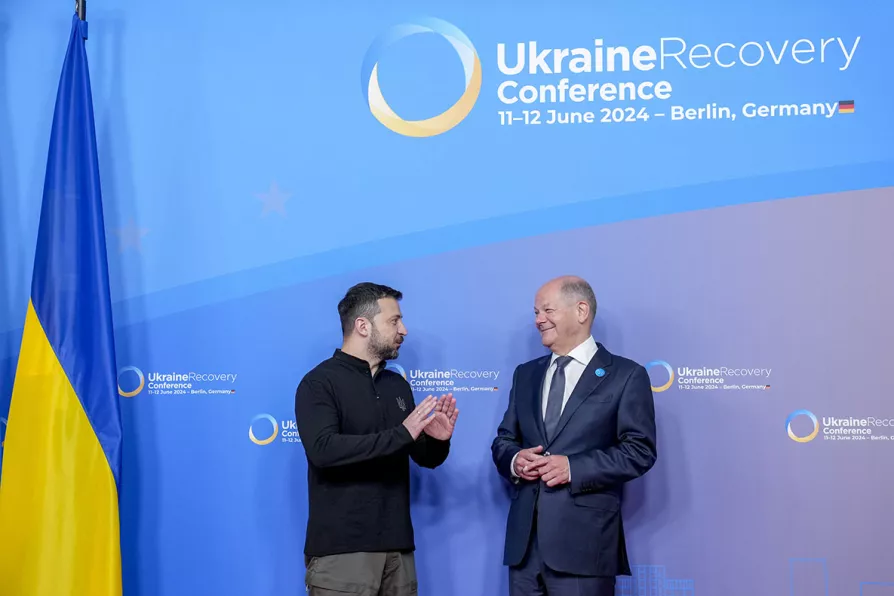
 Ukrainian President Volodymyr Zelenskyy (left) and German Chancellor Olaf Scholz talk at the start of the recovery conference in Berlin, Germany, June 11, 2024
Ukrainian President Volodymyr Zelenskyy (left) and German Chancellor Olaf Scholz talk at the start of the recovery conference in Berlin, Germany, June 11, 2024
UKRAINIAN President Volodymyr Zelensky appealed for short-term help in repairing his country’s electricity network and long-term investment in its energy system today.
Speaking at the two-day Ukraine Recovery Conference in Berlin today, Mr Zelensky also renewed calls for more help in repelling Russian missile attacks.
Among other immediate problems, sustained Russian attacks on Ukraine’s power grid in recent weeks have forced energy companies to institute nationwide rolling blackouts.
Mr Zelensky told the conference that, in the coming month, Ukraine needs equipment for heating and electricity plants that are currently out of action.
German Chancellor Olaf Scholz said the World Bank has estimated that rebuilding and modernising Ukraine will require investments of nearly $500 billion (£258bn) over the next 10 years.
Mr Scholz, whose country has become Ukraine’s second-biggest weapons supplier after the US, appealed anew to other allies to help strengthen Ukraine's air defence, “because the best reconstruction is that which doesn’t have to take place.”
Elsewhere, Russia and its ally Belarus launched a second stage of drills today intended to train their troops in tactical nuclear weapons, part of the Kremlin’s efforts to discourage the West from ramping up support for Ukraine.
In announcing the nuclear manoeuvres last month, the Russian Defence Ministry said they were in response to “provocative statements and threats of certain Western officials regarding the Russian Federation.”
The Kremlin expressed outrage after French President Emmanuel Macron said that he doesn’t exclude deploying troops to Ukraine, and the US and some other Nato countries allowed Kiev to use the weapons supplied by them for striking targets on Russian territory.
Speaking to reporters today, Kremlin spokesman Dmitry Peskov said that such drills and maintaining combat readiness are important in view of the “hostile decisions and actions” by the US and its allies in Europe and their “daily provocations.”
Meanwhile, the US lifted a ban on providing weapons and training to Ukraine’s neonazi Azov Brigade today.
The US had previously banned weapon sales to it, citing its fascist origins.
The Azov Brigade (formally battalion) grew out of far-right groups and formed in 2014 as one of several militias created to fight Russia-backed separatists in eastern Ukraine.
Years before Russia’s full-scale invasion of Ukraine in 2022, Human Rights Watch raised concerns about Azov, writing that credible allegations of egregious abuses had been made against its fighters.
It has since sought to recast its image and now rejects accusations of extremism and any ties with far-right movements.
The Kremlin has seized on the regiment’s origins in its efforts to cast Russia’s invasion as a battle against Nazi influence in Ukraine.
The Azov Brigade said US weapons would make it more powerful and dangerous to the Russians.













